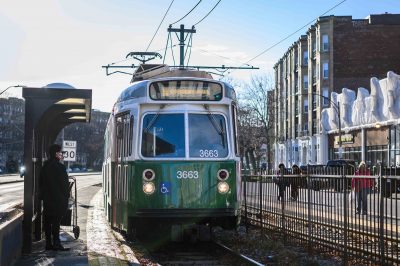The Massachusetts Bay Transportation Authority’s proposed service cuts have “no budgetary justification,” according to an independent report.

The MBTA’s Forging Ahead initiative produced reduced frequency on the subway, bus and Commuter Rail as early as spring 2021. Service would end after midnight for the subway and bus and after 9 p.m. for the Commuter Rail. Ferry service would be fully suspended.
Currently, most trains and buses run until at least 1 a.m., and some buses run all night.
The MBTA Advisory Board report suggested the MBTA create a Return to Service Commission to recommend restarting service.
“The MBTA will continue to make use of this extensive input and the numerous existing ways that stakeholders and members of the public can engage with the authority,” wrote Steve Poftak, general manager of the MBTA, in an email statement, “and it has no plans for a Return to Service Commission.”
Proposed changes are justified by lowered ridership, down to 26 percent of last year’s levels, according to the MBTA.
The MBTA considered multiple scenarios before making a decision, Poftak wrote, and none of their predictions included ridership levels returning to pre-COVID-19 levels.
However, the Board found that the MBTA’s projected deficit for fiscal year 2022 is $124 million less than was reported by the MBTA.
Brian Kane, the acting executive director of the MBTA Advisory Board, said the proposed service cuts are unnecessary at this time.
“[The MBTA doesn’t] like the fact that there’s low ridership right now,” Kane said. “But there’s low ridership because of the pandemic, and the governor that they report to is urging folks to stay home. So, the state can’t have it both ways.”
The service cuts would slow economic recovery after the pandemic, said Melissa Zampitella, executive director of Alewife Transportation Management Association.
“If people don’t have a robust and flexible and frequent … transit system, then they’re going to revert to driving their automobiles and traffic is going to be as bad or worse than it was before,” Zampitella said. “If they were to cut resources now, it’s going to be really hard to ramp things back up when people start to go back to the system.”
The MBTA has stated it is prioritizing essential travel, but Zampitella said access to public transportation is necessary everywhere.
“The system needs to be there for everyone,” Zampitella said. “Whether it’s commuters, whether it’s tourists, whether it’s students, there’s a lot of transit-dependent people in this state.”
With a potential vaccine on the way, Zampitella said, the MBTA should wait to make cuts. Federal and state resources should relieve the agency’s financial hardship, she added.
Kane also said because of the pandemic, ridership is unpredictable and traveling patterns might be different than what they normally were.
“The MBTA should wait until it figures out what new commuting patterns will be,” Kane said, “instead of trying to guess what they’re going to be and plan ahead.”


















































































































